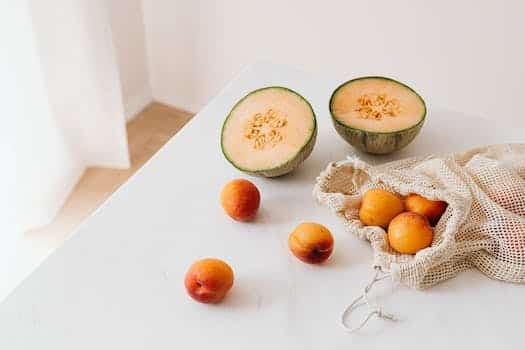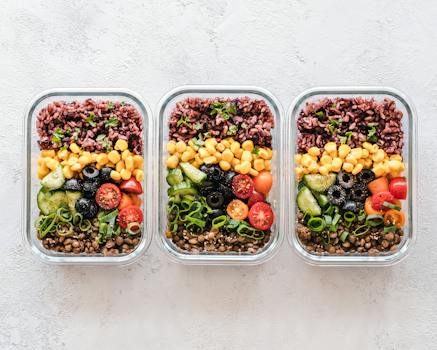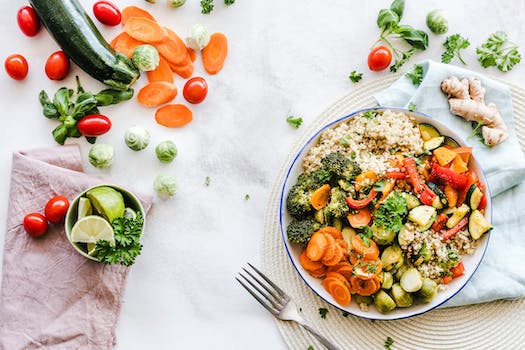
Creating a healthy meal plan for vegans can be a challenging task, especially if you are new to the vegan lifestyle. But fear not, as this ultimate guide aims to provide you with all the necessary information and tips to help you craft a nutritious and well-balanced meal plan. Whether you are looking to improve your health, protect the environment, or simply explore new culinary horizons, this guide will steer you in the right direction. From understanding the basic principles of vegan nutrition to showcasing delicious and creative recipe ideas, get ready to embark on a journey towards a healthier and more sustainable way of eating.
- 1. Introduction
- 1.1. Benefits of a healthy meal plan
- 1.2. Importance of a vegan diet
- 1.3. What is a vegan meal plan?
- 1.4. How to start a vegan meal plan
- 1.5. Tips for creating a balanced vegan meal plan
- 2. Nutritional Guidelines
- 2.1. Essential nutrients for vegans
- 2.2. Protein sources in a vegan diet
- 2.3. Incorporating whole grains and legumes
- 2.4. Importance of fruits and vegetables
- 2.5. Healthy fats in a vegan meal plan
- 3. Sample Vegan Meal Plan
- 3.1. Breakfast options
- 3.2. Lunch ideas
- 3.3. Dinner recipes
- 3.4. Snack choices
- 3.5. Beverage suggestions
1. Introduction
A healthy meal plan is essential for vegans who want to ensure that they are getting all the necessary nutrients from their diet. Whether you are a long-time vegan or just starting out, creating a well-balanced meal plan can help you meet your nutritional needs and maintain a healthy lifestyle. In this ultimate guide, we will provide you with all the information and tips you need to create a healthy meal plan that is specifically tailored for vegans. From understanding the basics of vegan nutrition to meal planning strategies and recipe ideas, this guide has got you covered. So let’s dive in and start creating a delicious and nutritious meal plan for your vegan lifestyle!
1.1. Benefits of a healthy meal plan
A healthy meal plan is essential for maintaining overall health and well-being. For vegans, a well-balanced and nutritious meal plan is particularly important, as it ensures that all necessary nutrients are obtained solely from plant-based sources. Creating a healthy meal plan can provide numerous benefits for vegans, including improved digestion, increased energy levels, weight management, and better overall health. By carefully selecting and combining a variety of plant-based foods, vegans can meet their nutritional needs and enjoy a vibrant and fulfilling lifestyle.
1.2. Importance of a vegan diet
A vegan diet is gaining popularity worldwide due to its numerous health benefits and ethical considerations. This dietary lifestyle excludes all animal-derived products, including meat, dairy, eggs, and honey. Instead, it focuses on consuming plant-based foods, such as fruits, vegetables, whole grains, legumes, nuts, and seeds. Adopting a vegan diet not only promotes better overall health but also has a positive impact on the environment and animal welfare. In this section, we will explore the importance of a vegan diet and how it can contribute to creating a healthy meal plan for vegans.
1.3. What is a vegan meal plan?
A vegan meal plan is a carefully curated menu that is designed to meet the nutritional needs of individuals who follow a vegan lifestyle. Veganism is a dietary practice that excludes all animal products, including meat, dairy, eggs, and honey. A vegan meal plan focuses on plant-based foods such as fruits, vegetables, whole grains, legumes, nuts, and seeds. It aims to provide all the necessary nutrients, vitamins, and minerals without the use of animal-derived ingredients. A well-planned vegan meal plan ensures that individuals receive an adequate intake of protein, iron, calcium, omega-3 fatty acids, and other essential nutrients. It also promotes overall health, helps prevent chronic diseases, and supports sustainable living.
1.4. How to start a vegan meal plan
Starting a vegan meal plan can be an exciting and rewarding journey towards a healthier and more sustainable lifestyle. Whether you are already a vegan or considering transitioning to a plant-based diet, a well-planned meal plan can ensure that you meet your nutritional needs while enjoying a variety of delicious and satisfying meals.
In this comprehensive guide, we will walk you through the steps of creating a healthy meal plan specifically tailored for vegans. From understanding the basics of a vegan diet to practical tips for meal prepping and grocery shopping, we’ve got you covered!
So, let’s dive in and discover how to embark on your vegan meal planning adventure!
1.5. Tips for creating a balanced vegan meal plan
Creating a balanced vegan meal plan is essential for ensuring that you are meeting all your nutritional needs. As a vegan, it is important to include a variety of plant-based foods in your diet to get all the essential nutrients. Here are some tips to help you create a balanced vegan meal plan:
1. Include a variety of fruits and vegetables: Fruits and vegetables are packed with vitamins, minerals, and antioxidants that are essential for maintaining good health. Aim to include a wide range of colorful fruits and vegetables in your meals to ensure you are getting a diverse array of nutrients.
2. Incorporate whole grains: Whole grains like quinoa, brown rice, oats, and whole wheat bread are excellent sources of fiber, protein, and complex carbohydrates. These foods not only provide sustained energy but also help keep you feeling full and satisfied.
3. Don’t forget about protein: Many people mistakenly believe that it is difficult to get enough protein on a vegan diet. However, there are plenty of plant-based protein sources such as legumes, tofu, tempeh, seitan, and plant-based protein powders. Including a variety of these protein-rich foods in your meals will ensure you are meeting your protein needs.
4. Include healthy fats: Healthy fats, such as those found in avocados, nuts, seeds, and olive oil, are essential for optimal health. These fats provide important nutrients and help support brain function and hormone production. Including a moderate amount of healthy fats in your vegan meal plan is important.
5. Be mindful of micronutrients: While a well-planned vegan diet can provide all the necessary macronutrients (carbohydrates, proteins, and fats), it is important to pay attention to certain micronutrients that are commonly found in animal products. These include vitamin B12, iron, calcium, and omega-3 fatty acids. Consider incorporating fortified plant-based milk, nutritional yeast, leafy greens, and flaxseeds into your meals to ensure you are getting these important nutrients.
By following these tips and being mindful of your nutritional needs, you can create a balanced vegan meal plan that supports your health and well-being.
2. Nutritional Guidelines
A crucial aspect of creating a healthy meal plan for vegans is to ensure it meets all the necessary nutritional guidelines. As a vegan, it is important to consume a variety of plant-based foods in order to get all the essential nutrients. Here are some key guidelines to keep in mind:
1. Protein: Include a variety of protein-rich foods such as legumes (beans, lentils, chickpeas), tofu, tempeh, seitan, and edamame. These sources provide essential amino acids that are necessary for proper body function.
2. Calcium: Incorporate calcium-rich foods like dark leafy greens (kale, spinach, collard greens), tofu, fortified plant-based milk, and almonds. Calcium is essential for strong bones and teeth.
3. Iron: Consume iron-rich foods like lentils, chickpeas, tofu, quinoa, fortified cereals, and dark chocolate. Iron is important for transporting oxygen throughout the body.
4. Vitamin B12: Since B12 is primarily found in animal products, it is important for vegans to include fortified foods like plant-based milk, breakfast cereals, and nutritional yeast in their diet. Alternatively, B12 supplements can be taken.
5. Omega-3 fatty acids: Incorporate plant-based sources of omega-3s like flaxseeds, chia seeds, hemp seeds, walnuts, and algae-based supplements. Omega-3s are beneficial for heart health.
6. Vitamin D: Ensure adequate vitamin D intake by spending time in the sun or considering a vitamin D supplement. Additionally, fortified plant-based milk and cereals can contribute to vitamin D intake.
Remember to also consume a variety of fruits, vegetables, whole grains, and healthy fats to round out your meal plan. Consulting a registered dietitian who specializes in vegan nutrition can further assist in creating a well-balanced and nutrient-dense meal plan.
2.1. Essential nutrients for vegans
Vegans, who follow a plant-based diet, need to ensure they are getting all the essential nutrients their bodies require. By incorporating a variety of plant-based foods, vegans can easily meet their nutritional needs. Here are some essential nutrients for vegans to include in their diet:
1. Protein: While many people associate protein with animal products, there are plenty of plant-based sources of protein. Legumes, such as beans, lentils, and chickpeas, are excellent sources of protein. Additionally, tofu, tempeh, and seitan are great options for vegans.
2. Iron: Plant-based sources of iron include dark leafy greens like spinach and kale, as well as lentils, beans, and fortified cereals. To enhance iron absorption, it is recommended to consume these foods along with a source of vitamin C, such as citrus fruits or bell peppers.
3. Calcium: Contrary to popular belief, dairy products are not the only source of calcium. Vegans can obtain calcium from plant-based sources such as tofu, fortified plant-based milk, almonds, and leafy greens like broccoli and bok choy.
4. Omega-3 fatty acids: While commonly found in fish, vegans can still get their dose of omega-3 fatty acids from sources like flaxseeds, chia seeds, walnuts, and hemp seeds. These seeds can be easily incorporated into smoothies, salads, or baked goods.
5. Vitamin B12: This vitamin is primarily found in animal products, so it is important for vegans to consider supplementation or consume foods fortified with B12. Nutritional yeast, fortified plant-based milks, and certain breakfast cereals are common sources of B12 for vegans.
By including these essential nutrients in their diet, vegans can ensure they are meeting their nutritional requirements and maintaining a healthy lifestyle.
2.2. Protein sources in a vegan diet
Protein sources in a vegan diet are essential for meeting the nutritional needs of individuals following a plant-based lifestyle. While it is a common misconception that vegans struggle to obtain enough protein, there are actually numerous plant-based sources that can provide ample amounts of this vital nutrient. These protein sources include legumes such as lentils, chickpeas, and black beans, which are not only rich in protein but also contain fiber and other essential nutrients. Additionally, tofu and tempeh are excellent sources of protein and can be used as versatile ingredients in various dishes. Other plant-based protein sources include quinoa, chia seeds, hemp seeds, and nuts such as almonds and walnuts. By incorporating a variety of these protein-rich foods into a vegan diet, individuals can ensure they are meeting their nutritional requirements and maintaining a balanced meal plan.
2.3. Incorporating whole grains and legumes
Incorporating whole grains and legumes is essential when following a vegan meal plan. These plant-based foods are rich in nutrients, fiber, and protein, making them an excellent choice for vegans. Whole grains such as quinoa, brown rice, oats, and barley provide essential carbohydrates and are packed with vitamins, minerals, and antioxidants. Legumes, including beans, lentils, and chickpeas, are an excellent source of protein, iron, and fiber. They also contain various beneficial compounds that promote heart health and help regulate blood sugar levels. By including a variety of whole grains and legumes in your meals, you can ensure a well-rounded and satisfying vegan diet.
2.4. Importance of fruits and vegetables
Fruits and vegetables play a crucial role in maintaining a healthy and balanced vegan diet. These nutrient-rich foods provide essential vitamins, minerals, and antioxidants that support overall well-being. Incorporating a variety of fruits and vegetables into your meals not only ensures a diverse range of nutrients but also adds vibrant flavors and colors to your plate. Moreover, fruits and vegetables are naturally low in calories and high in fiber, making them an excellent choice for weight management and promoting digestive health. Including a generous amount of fruits and vegetables in your daily meal plan is essential for meeting your nutritional needs as a vegan.
2.5. Healthy fats in a vegan meal plan
Incorporating healthy fats into a vegan meal plan is essential for maintaining optimal nutrition and overall well-being. While many people associate fats with unhealthy foods, it’s important to note that not all fats are created equal. In fact, certain types of fats are not only beneficial but necessary for our bodies to function properly.
One excellent source of healthy fats for vegans is avocados. Avocados are rich in monounsaturated fats, which have been shown to help reduce bad cholesterol levels and decrease the risk of heart disease. They are also packed with essential nutrients such as potassium, vitamin K, vitamin E, and vitamin C.
Another great option is nuts and seeds. These plant-based sources of fat are incredibly versatile and can be easily incorporated into various meals and snacks. Whether you choose almonds, walnuts, chia seeds, or flaxseeds, they provide a good amount of omega-3 fatty acids, which are known for their anti-inflammatory properties and support brain health.
Furthermore, coconut oil can be a valuable addition to a vegan meal plan. Although it’s high in saturated fat, it mainly consists of medium-chain triglycerides (MCTs) that are metabolized differently by the body. MCTs are quickly converted into energy and can help boost metabolism and enhance weight management.
Lastly, don’t forget about olives and olive oil. These are excellent sources of monounsaturated fats and are commonly used in Mediterranean cuisine. Olive oil can be used in salad dressings, sautéing vegetables, or drizzling over roasted dishes, providing a delightful flavor and adding healthy fats to your vegan meals.
In conclusion, incorporating healthy fats into a vegan meal plan is crucial for obtaining essential nutrients and promoting overall health. Avocados, nuts and seeds, coconut oil, and olives/olive oil are all excellent options to consider when creating a well-rounded and nutritious vegan diet.
3. Sample Vegan Meal Plan
A vegan meal plan is a great way to ensure that you are getting all the necessary nutrients while following a plant-based diet. Here is a sample vegan meal plan to help you get started on your journey to a healthier lifestyle:
3.1. Breakfast options
For those following a vegan diet, breakfast options can be diverse and delicious. Here is a sample vegan meal plan to kickstart your day with a nutritious and satisfying breakfast:
1. Overnight Chia Pudding: Combine chia seeds, plant-based milk, and a sweetener of choice in a jar. Let it sit overnight in the refrigerator. In the morning, top it with fresh fruits, nuts, and seeds for added crunch.
2. Vegan Pancakes: Make fluffy pancakes using a mixture of plant-based milk, flour, baking powder, and a pinch of salt. Serve them with maple syrup and your favorite fruits.
3. Tofu Scramble: Crumble tofu in a pan and sauté it with vegetables like bell peppers, onions, and spinach. Season it with turmeric, black salt, and pepper for a flavorful and protein-packed breakfast.
4. Avocado Toast: Toast whole-grain bread and spread mashed avocado on top. Sprinkle some lemon juice, salt, and red pepper flakes for an extra kick. Add sliced tomatoes or a drizzle of balsamic glaze for more flavor.
5. Fruit Smoothie Bowl: Blend frozen fruits like berries, bananas, and mangoes with plant-based milk until smooth. Pour the smoothie into a bowl and top it with granola, coconut flakes, and a variety of fresh fruits.
Remember to adjust the portion sizes and ingredients according to your dietary needs and preferences. Enjoy these breakfast options as part of a well-rounded vegan meal plan to start your day on a healthy note!
3.2. Lunch ideas
Here is a sample vegan meal plan to help you create a healthy and delicious lunch. This meal plan is packed with nutritious ingredients and balanced flavors to keep you satisfied throughout the day.
Monday
– Lunch: Quinoa and roasted vegetable salad with lemon-tahini dressing
Tuesday
– Lunch: Lentil and vegetable curry with brown rice
Wednesday
– Lunch: Chickpea salad wraps with avocado and hummus
Thursday
– Lunch: Sweet potato and black bean tacos with salsa and guacamole
Friday
– Lunch: Mediterranean quinoa salad with cucumber, tomatoes, and olives
Saturday
– Lunch: Thai coconut curry with tofu and vegetables
Sunday
– Lunch: Roasted vegetable and quinoa buddha bowl with tahini dressing
Feel free to adjust the meal plan according to your preferences and dietary needs. Remember to include a variety of fruits, vegetables, whole grains, legumes, and plant-based proteins in your meals for a well-rounded vegan diet.
3.3. Dinner recipes
For those following a vegan diet, dinner can be a delicious and satisfying meal. With a wide variety of plant-based ingredients available, there are endless possibilities for creating flavorful and nutritious dinner recipes. Whether you’re a seasoned vegan or just starting out, having a sample vegan meal plan can be helpful in ensuring you’re getting all the necessary nutrients while enjoying tasty meals.
Here is a sample vegan meal plan for dinner:
1. Monday:
– Lentil and vegetable curry served with brown rice
– Mixed green salad with a lemon-tahini dressing
2. Tuesday:
– Chickpea and vegetable stir-fry with quinoa
– Steamed broccoli on the side
3. Wednesday:
– Spaghetti with marinara sauce topped with sautéed mushrooms, bell peppers, and onions
– Caesar salad with homemade vegan dressing
4. Thursday:
– Sweet potato and black bean enchiladas with salsa verde
– Mexican-style corn salad
5. Friday:
– Vegan sushi rolls filled with avocado, cucumber, and pickled ginger
– Miso soup with tofu and seaweed
6. Saturday:
– Quinoa and black bean burgers served with whole wheat buns
– Baked sweet potato fries
7. Sunday:
– Roasted vegetable and tofu stir-fry with brown rice
– Asian-inspired slaw with sesame-ginger dressing
Feel free to adjust the portion sizes or swap out ingredients based on your preferences and dietary needs. Remember to include a variety of fruits, vegetables, whole grains, legumes, and plant-based proteins in your vegan meal plan to ensure you’re getting a well-rounded diet.
Enjoy these dinner recipes and explore other plant-based options to create your own healthy and delicious vegan meal plan!
3.4. Snack choices
When it comes to creating a healthy meal plan for vegans, one important aspect to consider is the selection of snacks. Snacks provide an opportunity to incorporate additional nutrients and keep energy levels up throughout the day. Here are some snack choices that are perfect for a vegan diet:
1. Fresh fruits: Fruits like apples, bananas, oranges, and berries are not only delicious but also packed with vitamins, minerals, and fiber.
2. Raw vegetables: Snacking on raw veggies such as carrots, celery sticks, and bell peppers is a great way to add more nutrients to your diet.
3. Nuts and seeds: Almonds, walnuts, pumpkin seeds, and chia seeds are excellent sources of healthy fats, protein, and essential minerals.
4. Hummus and whole grain crackers: Enjoying some whole grain crackers with a side of hummus provides a satisfying and nutritious snack option.
5. Vegan protein bars: Look for protein bars that are specifically made for vegans and contain ingredients like plant-based protein, nuts, and dried fruits.
Including these snack choices in your vegan meal plan will not only help curb hunger between meals but also provide a variety of nutrients to support your overall health.
3.5. Beverage suggestions
When it comes to creating a healthy meal plan for vegans, it is essential to consider beverage options that complement the overall nutritional needs of a plant-based diet. Here are some beverage suggestions to include in your vegan meal plan:
1. Water: Staying hydrated is crucial for overall health. Make sure to include an ample amount of water in your daily routine.
2. Herbal Teas: Herbal teas are not only flavorful but also offer various health benefits. Choose from a wide range of options such as chamomile, peppermint, or ginger tea.
3. Fresh Juices: Incorporating fresh fruit and vegetable juices into your meal plan is an excellent way to boost your nutrient intake. Opt for homemade juices or cold-pressed options without added sugars.
4. Plant-based Milk Alternatives: Replace dairy milk with plant-based alternatives like almond milk, soy milk, or oat milk. These alternatives are often fortified with essential nutrients like calcium and vitamin D.
5. Smoothies: Smoothies are a great way to pack in a variety of fruits, vegetables, and plant-based proteins into one delicious beverage. Experiment with different combinations to find your favorite.
Remember to choose beverages that align with your personal preferences and dietary goals. Incorporating these suggestions into your vegan meal plan can help ensure a well-rounded and enjoyable dining experience.
Conclusion
In conclusion, creating a healthy meal plan for vegans requires careful consideration of nutrient needs and a variety of plant-based foods. By incorporating a balance of protein, carbohydrates, healthy fats, and essential vitamins and minerals, individuals can ensure they are meeting their dietary requirements. Additionally, it is important to be mindful of portion sizes and to listen to your body’s hunger and fullness cues. With proper planning and a focus on nutrient-rich foods, vegans can easily maintain a well-rounded and nutritious diet.



Creating a healthy meal plan for vegans can indeed be a challenging task, particularly for those who are new to the vegan lifestyle. However, I am here to assure you that this ultimate guide has got you covered. With a comprehensive and concise approach, it provides the necessary information and guidance to help you navigate through the process seamlessly. From understanding the key nutrients to incorporating a variety of plant-based foods, this guide ensures that you can create a well-balanced and nourishing meal plan that meets all your dietary needs. So, dive right in and let this ultimate guide be your trusted companion on your vegan journey.
Hey there! Being a normal human visitor, I can totally relate to the struggles of creating a healthy meal plan for vegans, especially when youre just starting out. But guess what? This ultimate guide is here to save the day! Its gonna provide you with all the necessary info you need, without any unnecessary chit-chat. So, buckle up and get ready to dive into the world of vegan meal planning like a pro! Good luck! 🌱
Hey there! Being new to the vegan lifestyle can definitely feel overwhelming when it comes to creating a healthy meal plan. But dont worry, this ultimate guide has got your back! Its designed to give you a clear and concise string of steps to follow, so you can easily navigate through the process. So, say goodbye to any worries and get ready to embrace a delicious and nutritious vegan meal plan!
In the highly informative post titled Creating a healthy meal plan for vegans, the author acknowledges the inherent challenges faced by individuals new to the vegan lifestyle. The post acts as an ultimate guide, providing extensive information and practical tips to assist readers in navigating this dietary transition successfully. By focusing solely on the given content, it is evident that the authors objective is to offer a comprehensive response to the difficulties encountered when planning vegan meals. As such, readers can expect to find valuable guidance without any additional subjective commentary.